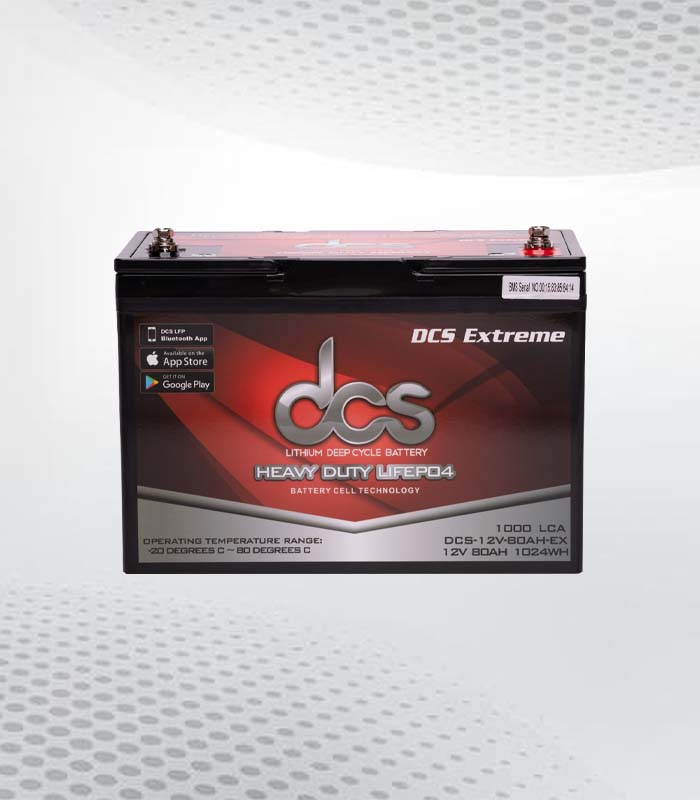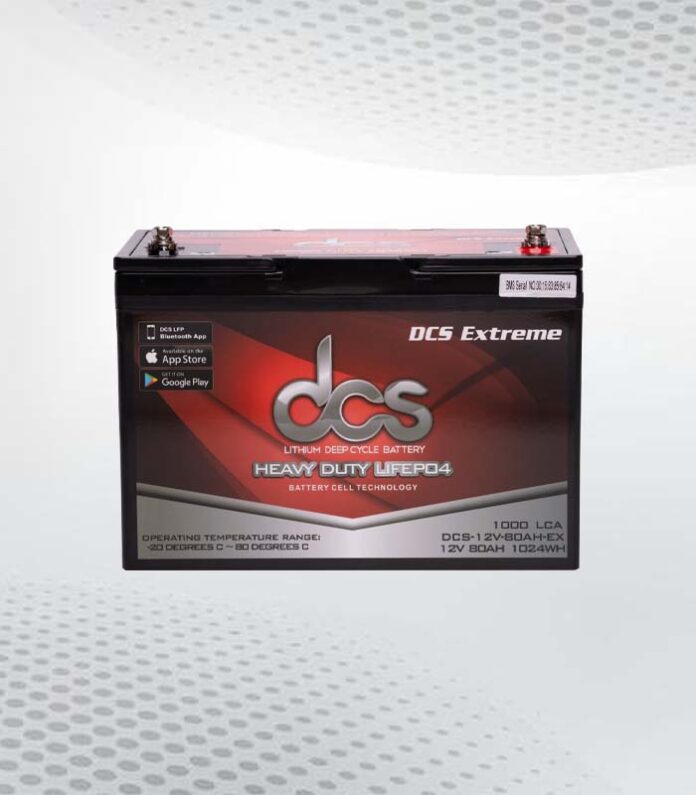An 80Ah marine battery is essential for any boat owner or sailor. This type of battery is specifically designed to withstand the harsh conditions of aquatic environments, making it a reliable power source on the water. With a capacity of 80Ah, it can provide a significant amount of energy, making it a popular choice for powering various electronic devices on board. The marine battery ensures a smooth and safe sailing experience, from starting the engine to running navigation systems and lights.
Exploring the Advantages of a Marine Battery
An 80-ah marine battery stands out due to its exceptional durability and ability to provide a consistent power supply in challenging marine environments. Engineered with robustness in mind, these batteries are adept at handling the constant movement, vibrations, and saltwater exposure inherent to the marine setting. The construction of an 80-ah marine battery ensures it remains resistant to the corrosive effects of saltwater, a common downfall for standard batteries used in such conditions.
Furthermore, the steady power output of these batteries guarantees that marine equipment operates efficiently, preventing the power fluctuations that can hinder the performance of sensitive electronic devices. This makes the marine battery a cornerstone for those seeking reliability and performance in marine applications, ensuring that navigational and communication devices, amongst others, receive an uninterrupted power supply.
The Key Features of a Marine Battery
The hallmark attributes of an 80-ah marine battery are embodied in its design and construction, tailored to meet the exacting demands of aquatic environments. These batteries are distinguished by their deep-cycle capability, allowing for repeated discharge and recharge cycles without significant degradation in performance. This characteristic is critical for applications that require a steady power draw over extended periods, such as powering navigational systems and other onboard electronics.
Additionally, marine batteries are equipped with thick plates and a robust internal structure, which enhances their durability and aids in resistance against the physical stresses of an aquatic setting, including vibrations and impacts. A significant feature is their sealed design, which mitigates the risk of leakage and minimises maintenance needs, making them an ideal choice for marine use where access to battery maintenance facilities can be limited.
Comparing Marine Battery with Other Battery Types
A crucial aspect distinguishing marine batteries from their automotive counterparts is their bespoke engineering for resilience against marine-specific challenges. Unlike car batteries, primarily designed to provide a short burst of power necessary for starting an engine, marine batteries must endure prolonged exposure to harsh conditions. They are meticulously constructed to withstand the significant vibrations and shocks prevalent in marine environments, thus extending their durability and operational lifespan.
Furthermore, marine batteries exhibit a steady and consistent power output capacity, a vital requirement for the seamless operation of marine equipment. This distinct construction and design philosophy ensures that marine batteries offer superior performance and reliability compared to standard automotive batteries, highlighting their specialised Role in marine applications.
How to Choose the Right Marine Battery
Selecting the appropriate marine battery necessitates carefully considering various factors contributing to its efficiency and suitability for marine applications. The dimensions and mass of the battery should align with the vessel’s spatial constraints and weight allowances. Furthermore, the ampere-hour (Ah) rating indicates the battery’s storage capacity, which must be matched with the energy requirements of the onboard equipment to ensure optimal functionality.
The construction quality of the battery also plays a pivotal role, as it needs to withstand the rigours of marine environments, including exposure to saltwater and persistent vibrations. Assessing these elements helps identify a marine battery that not only meets the specific demands of a boat but also supports the seamless operation of all connected devices and equipment, contributing to a safer and more reliable marine experience.
The Benefits of Using an 80ah Leisure Battery for Leisure Activities
An 80Ah leisure battery is superior for many leisure activities, including camping, fishing, and exploring the great outdoors. Its substantial capacity ensures a robust and consistent energy source, indispensable for powering a wide array of portable devices, lighting solutions, and other outdoor equipment. These batteries are crafted to deliver a seamless power supply, a feature that significantly enhances the outdoor experience by eliminating concerns over power shortages.
The dependability of an leisure battery becomes particularly evident during extended periods away from conventional power sources, where it stands as a bulwark against the inconvenience of depleted devices. Furthermore, the inherent maintenance-free design of these batteries adds a layer of convenience, sparing users the hassle of regular upkeep. Thus, an leisure battery broadens the horizon for outdoor enthusiasts and anchors the reliability and enjoyment of their adventures in the natural world.
 Understanding the Leisure Battery
Understanding the Leisure Battery
A leisure battery, characterised by its 80-ah capacity, is engineered to cater to the consistent and steady energy demands of leisure pursuits such as camping and fishing. These batteries distinguish themselves by their capacity to power a diverse array of portable electronics and camping gear, ensuring that outdoor activities proceed without interrupting power shortages.
Constructed with a focus on being maintenance-free, leisure batteries alleviate the need for regular upkeep, thus offering users an added layer of convenience. Their design underscores a commitment to reliability and efficiency in leisure applications, making them an indispensable component for those engaging in outdoor adventures.
The Role of an 80ah battery for inverter
An battery is fundamentally designed to cater to the energy requirements of inverters, which play a pivotal role in transforming DC power into AC power. This variety of batteries is exceptionally suited for integration with inverters, especially in marine environments where the resilience to withstand vibrations and shocks is paramount.
The capability of an 80ah Battery For Inverter to provide a steadfast and uninterrupted power supply is critical in ensuring that the inverter operates efficiently, facilitating smooth conversion processes without disruptions. The reliability and consistency of power output from an 80Ah battery make it indispensable for inverters in scenarios demanding high-performance energy solutions.
Tips for Maintaining Your 80Ah Battery
Maintaining an 80Ah battery efficiently involves a series of practices designed to enhance its longevity and ensure its reliability for powering marine and leisure equipment. Proper maintenance routines are indispensable, given the pivotal Role these batteries play in various applications. Here are key strategies to uphold the health and performance of an 80Ah battery:
Regular Inspection and Cleaning
Periodic checks should be conducted to identify and rectify any signs of wear or damage. Keeping the battery terminals clean is crucial to prevent the build-up of corrosion, which can impede electrical conductivity. A solution of soda and water bicarbonate can be used to clean the terminals effectively.
Maintaining Optimal Charge Levels
It is essential to keep the battery adequately charged to avert the detrimental effects of deep discharging. A quality charger that matches the battery’s specifications will ensure that it is neither undercharged nor overcharged, which can significantly affect its lifespan.
Avoiding Extreme Temperatures
Exposure to very high or low temperatures can harm the battery. It stores the battery in a cool, dry place when unused, protecting it from extreme temperature conditions that could accelerate degradation.
Periodic Equalisation
An equalisation charge might occasionally be necessary for lead-acid types. This process helps balance the battery cells and restore full capacity by reversing the build-up of sulphates.
Ensuring Proper Installation
Correct installation and securing of the battery within the marine or leisure vehicle are vital. It should be mounted to minimise exposure to constant vibrations or shocks, which could lead to internal damage or loose connections.
Adhering to these maintenance tips ensures that the 80Ah battery remains a reliable power source, ready to meet the demands of its various applications.
Innovative Uses for 80Ah Batteries
Beyond their traditional roles, 80Ah batteries find application in various innovative settings, demonstrating their versatility and robust capacity. These batteries are increasingly becoming a cornerstone for powering off-grid cabins and recreational vehicles (RVs), which serve as a reliable energy source away from traditional power grids. Their substantial energy storage capability also makes them ideal candidates for integrating with solar panel systems, providing an effective solution for storing renewable energy.
Furthermore, the adaptability of 80Ah batteries extends to supporting emergency power systems in residential and commercial settings, where they can offer critical backup power during outages. This breadth of applications highlights the utility of 80Ah batteries in diverse scenarios and underscores their contribution to sustainability and energy independence in modern energy solutions.
Real-World Applications of inverter for 80ah battery
Integrating an Inverter For 80ah Battery finds its place in many practical scenarios, showcasing the utility of this combination in bringing electrical power to off-grid locations and enhancing the energy independence of individuals and communities. Such setups are particularly invaluable in remote areas where traditional electricity access remains challenging.
The pairing effectively powers various devices, tools, and appliances, from lighting and communication devices to essential household gadgets, facilitating a semblance of normalcy in environments detached from conventional power grids. It also proves pivotal in outdoor recreational activities, where it supplies the necessary energy to run camping equipment, portable coolers, and entertainment systems, enriching the outdoor experience.
Future Trends in Battery Technology
The horizon of battery technology is witnessing an unprecedented evolution, poised to redefine the parameters of capacity, efficiency, and lifespan. The propulsion of research and development efforts in this domain is anticipated to catalyse significant enhancements in the performance of batteries, including those with an 80-ah capacity. Innovations on the anvil include advancements in materials science, which promise to deliver batteries with higher energy densities and faster charging capabilities.
Moreover, the shift towards more sustainable and environmentally friendly options is expected to introduce batteries that are more efficient and less reliant on scarce or toxic materials. This transition will likely facilitate the emergence of batteries that can withstand more charge and discharge cycles, extending their operational longevity.
Conclusion
In summarising the discussion on the advantages of utilising an 80ah Marine Battery, it becomes evident that this battery type is an essential component for an array of marine and leisure applications. Its robust capacity and unwavering power supply, complemented by its resilience to withstand harsh marine environments, underscore its utility and reliability. The versatility of the 80-ah marine battery extends beyond marine usage, catering to leisure pursuits and offering a dependable energy solution for various settings.
FAQ’s
What distinguishes an 80Ah marine battery from other types of batteries?
The unique construction of an 80Ah marine battery enables it to endure the challenging conditions of aquatic environments, including resistance to saltwater corrosion and the ability to manage constant movements and vibrations.
How often should one charge an leisure battery?
The charging frequency for an leisure battery depends on its usage intensity and discharge levels. To ensure longevity, it is prudent to maintain optimal charge levels by charging the battery before it falls below 50% capacity.
Can an battery be used with any inverter?
While an battery is compatible with various inverters, it must match its specifications with the inverter’s requirements to optimise performance and avoid potential damage.
What are the signs that an battery needs replacing?
Indicators that an battery requires replacement include a significant decrease in performance, an inability to hold a charge, visible damage or swelling, and the battery’s age exceeding its expected lifespan.
How does temperature affect an battery’s performance?
Extreme hot and cold temperatures can adversely affect the performance and lifespan of an 80Ah battery. To maintain its efficacy, it is recommended to store and use the battery within the manufacturer’s recommended temperature range.
| Other Good Articles to Read |
| skank blogs |
| unreal blogs |
| tba blogs |
| all city forums |
| dany blogs |
| refuge blogs |
| the music blogs |
| key forums |
| the big blog theory |
| joe blogs |
| blogs 4 me |
| Blogs Emon |
| Related Business Listings |
| Directory Submissions |
| Regional Directory |
